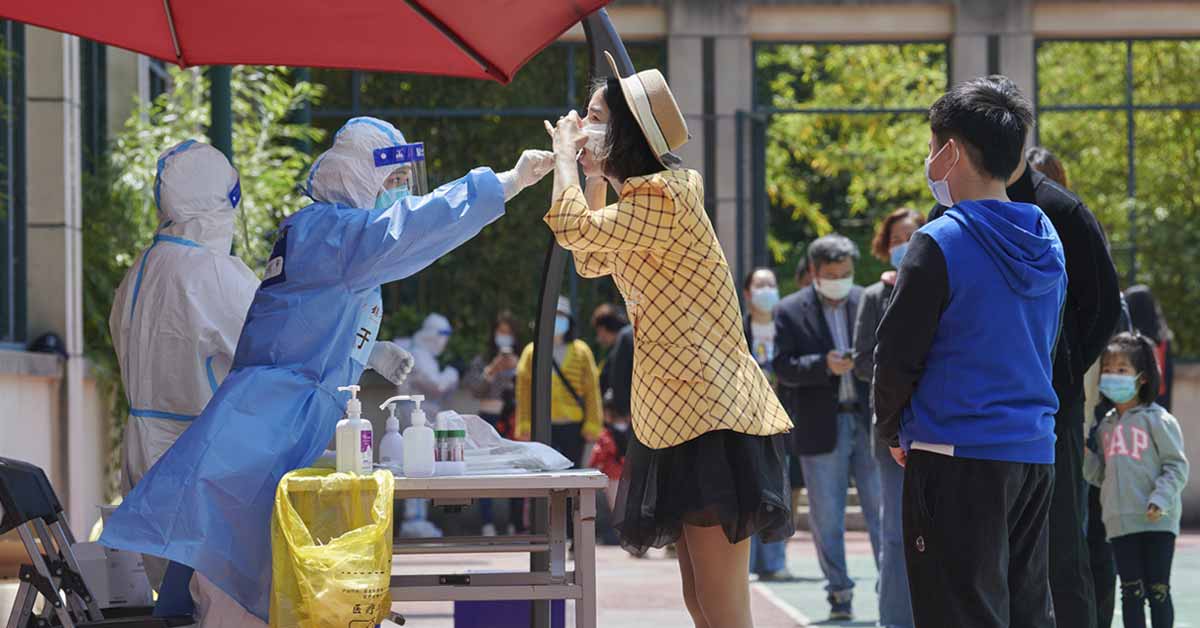The author of a viral video about Shanghai’s COVID-19 lockdown that sparked a rare show of defiance on China’s social media has urged users to stop sharing it, saying he is worried about his work being taken in directions he did not wish to see.
The creator, who goes by his online moniker Strawberry Fields Forever, said in a post on Saturday that the quick spread of the video, titled, “Voices of April”, was “unexpected” to him, and he was “touched” by messages received from fellow internet users.
“However, I don’t wish this video to be distributed in the directions I don’t want,” he added. “I hope everyone stops sharing, or please ask people you know to stop sharing.”
The six-minute short is a montage of audio snippets of official government announcements, as well as residents’ descriptions of their suffering during Shanghai’s strict lockdowns in the past three weeks.
The video, which pans across the city’s vast skyline, is presented without commentary and is shot mostly in black and white. The ending card of the video reads: “Get better soon, Shanghai.” It was taken down from the internet shortly after publication, but continued to spread on WeChat on Friday.
Users found creative ways to circulate the video, for example, embedding a QR code in a film poster, or directing others to cloud services to download it.
By Friday night, many WeChat users found different ways to keep the video alive and overwhelm the censors. China’s most populous city is entering its fourth week of lockdown. The metropolis of 25 million people is also a key financial hub in Asia.
But in the past three weeks, many residents have begun criticising the heavy-handed way the authorities have implemented the zero-COVID policy.
On Friday, Shanghai reported 12 new COVID-19 deaths, up from 11 a day before. The patients who died had an average age of 88, according to the authorities. They said that all had underlying health conditions and none had been vaccinated.
Seeing the case numbers and death toll rise, Shanghai is doubling down on its “dynamic clearance” to eradicate the spread of the virus, neighbourhood by neighbourhood. On Friday, authorities announced further strengthening of the lockdown.
With uncertainty lingering, internet users have found numerous ways to express their frustration in the past few days. Some mixed the British band Slaves’ 2015 single “Cheer Up London” with images of the city’s lockdowns.
Others changed the script of American comedy duo Key & Peele’s “A Man Who Enjoys a Continental Breakfast” and dubbed it in Shanghainese dialect, to imagine what it would look like when a Shanghai man was finally allowed to enjoy a nice breakfast after the lockdown was lifted. By Saturday afternoon, many of the critical posts had been taken down by the censors.
Analysts said Friday’s eruption of dissenting creativity was reminiscent of a similar episode in the early days of the Wuhan lockdown. In early March 2020, Chinese internet users used creative ways to keep a censored magazine profile of a Wuhan medical professional circulating.
“After weeks of draconian lockdown, there’s a sense of deep frustration and discontentment for residents of Shanghai, but also a sense of solidarity for those who were not in the middle of it,” said Dali Yang, a political scientist at the University of Chicago. “I am surprised that many who were reposting the video and other materials did not see the act as political.”
“For the authorities, this collective action and the implied criticism of the lockdown sends a potent message they are working hard to censor. Our understanding of this act also needs to be considered with the localised acts of defiance and protest, in the beating of cooking utensils and the non-compliance with nucleic acid testing orders.”
Hu Xijin, the former editor of nationalist tabloid the Global Times weighed in late on Friday night to justify the erasure of the video. He said the internet was invented by the west, so when it entered China it ought to be “sinofied”.
He urged citizens to trust the government and remain confident in China’s resilience. The phrase “The Voices of April” has now been taken down on Weibo. But some Chinese users are posting images with quotes to indirectly express their dissatisfaction.
In one entry, Jin Xing, one of Shanghai’s best-known TV talk show hosts, posted a photo of Mao Zedong with the quote: “People in China and around the world, even our enemies, will use the performance of our work in Shanghai to examine whether our party has the ability to manage a big city and the whole country.”
At times, the subtle show of defiance was poetic. One user commented, in response to the censoring of Voices of April, with a poem from TS Eliot’s The Waste Land:
“April is the cruellest month, breeding
Lilacs out of the dead land, mixing
Memory and desire, stirring
Dull roots with spring rain”
But as censors rushed to take down explicitly critical content, users began to post materials that on the surface did not seem as controversial.
On WeChat, some used a clip from one of China’s foreign ministry spokespeople, in which she said Chinese citizens have the right to free speech and freedom of thought.
Others quoted the phrase from China’s zero-COVID policy to describe the cat-and-mouse game with the censors. “This is called ‘dynamic clearance’,” they wrote.
